 Essay Writing Web
Essay Writing Web
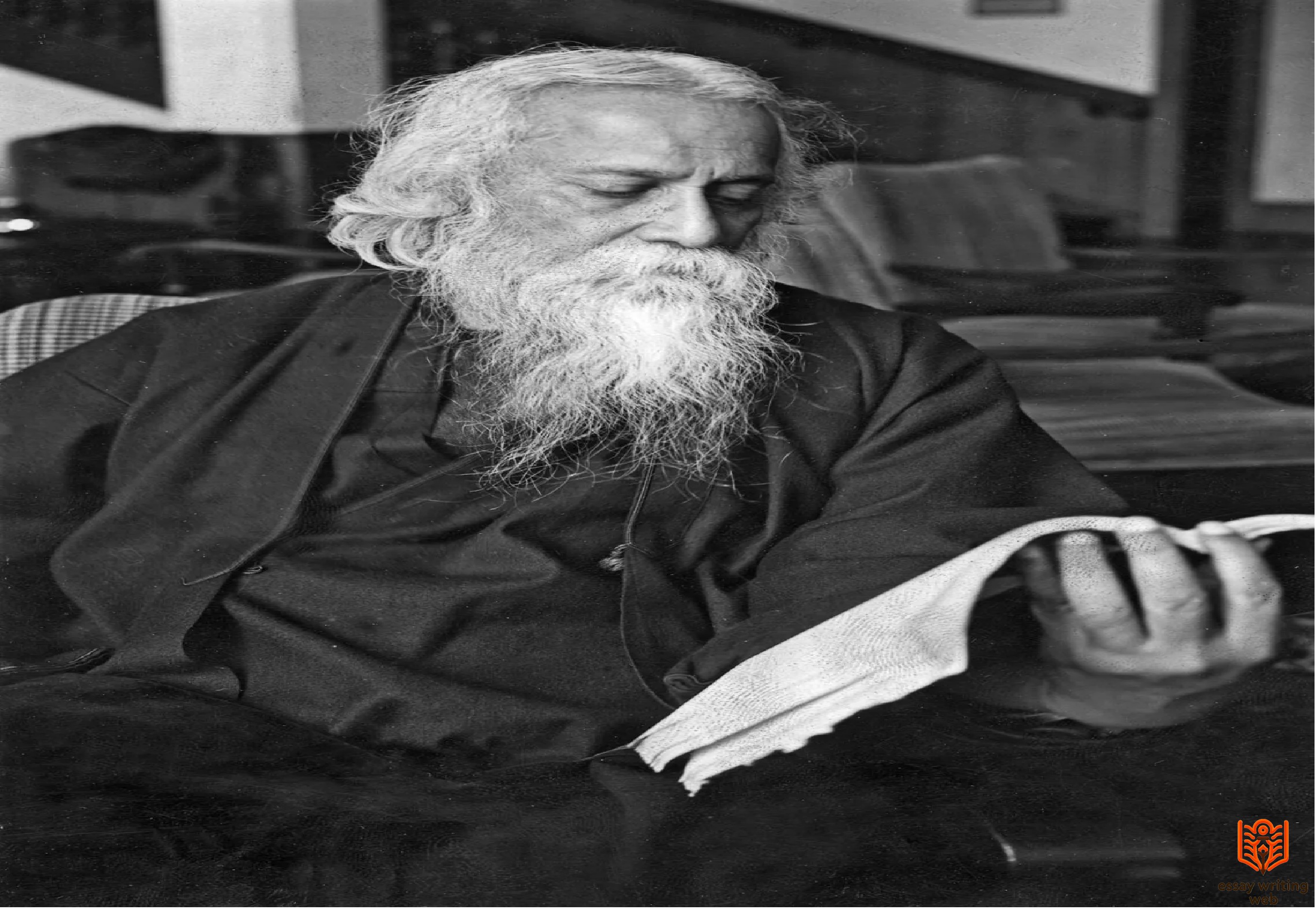
 05-09-2024
05-09-2024
 www.essaywritingweb.com
www.essaywritingweb.com
Rabindranath Tagore, a towering figure in world Indian culture and literature, was born on May 7, 1861, in Calcutta (now Kolkata), India. His contribution to literature, music, art, and philosophy has left an indelible mark on the intellectual and cultural fabric of not only India but the world. Tagore's literary genius was recognized globally when he became the first non-European to win the Nobel Prize in Literature in 1913 for his magnum opus Gitanjali (Song Offerings). His works transcend the boundaries of language and culture, encompassing themes of universal humanism, spirituality, and a deep connection with nature.
As a poet, Tagore's works reflect his profound philosophical insights, advocating for harmony between humanity and the natural world. His writings and thoughts also played a significant role in India’s struggle for independence, promoting values of peace, unity, and self-reliance. Beyond literature, he was a polymath who contributed to education by founding the Visva-Bharati University, which promoted learning through creativity and free thinking.
Tagore’s music, particularly his compositions of Rabindra Sangeet, has become an integral part of Bengali culture. His deep interest in art led him to create thousands of paintings later in his life. Tagore was also a staunch advocate for internationalism, believing in a world united by mutual respect and understanding, transcending political boundaries. His legacy continues to inspire generations with his message of cultural pride and universal love.
Rabindranath Tagore was born on May 7, 1861, into an influential and culturally rich family in Calcutta (now Kolkata), India. His family, known as the Tagore family, played a significant role in Bengal's cultural and intellectual renaissance during the 19th century. Rabindranath Tagore was the youngest of thirteen children born to Debendranath Tagore and Sarada Devi. His father, Debendranath Tagore, was a prominent philosopher and religious reformer, associated with the Brahmo Samaj, a movement that sought to reform Hindu society by discarding idolatry and promoting monotheism.
The Tagore family was renowned for its contributions Bengali culture, education, and social reform. Many of Rabindranath's siblings were accomplished in various fields, including literature, music, and art. This rich intellectual environment greatly influenced young Rabindranath, exposing him to diverse ideas and artistic expressions from an early age. His upbringing was unconventional, as he was educated at home by private tutors rather than attending formal schooling. This freedom allowed him to explore literature, music, and nature more deeply, shaping his creative instincts.
Rabindranath’s mother, Sarada Devi, passed away when he was young, leaving him to be raised largely by servants and siblings. His father’s spiritual influence, combined with the artistic and intellectual atmosphere of his household, provided the perfect environment for his literary and philosophical growth. Tagore’s deep connection to his family’s cultural and spiritual legacy was a foundation for his later works, which blended tradition with innovative thinking and universal themes.
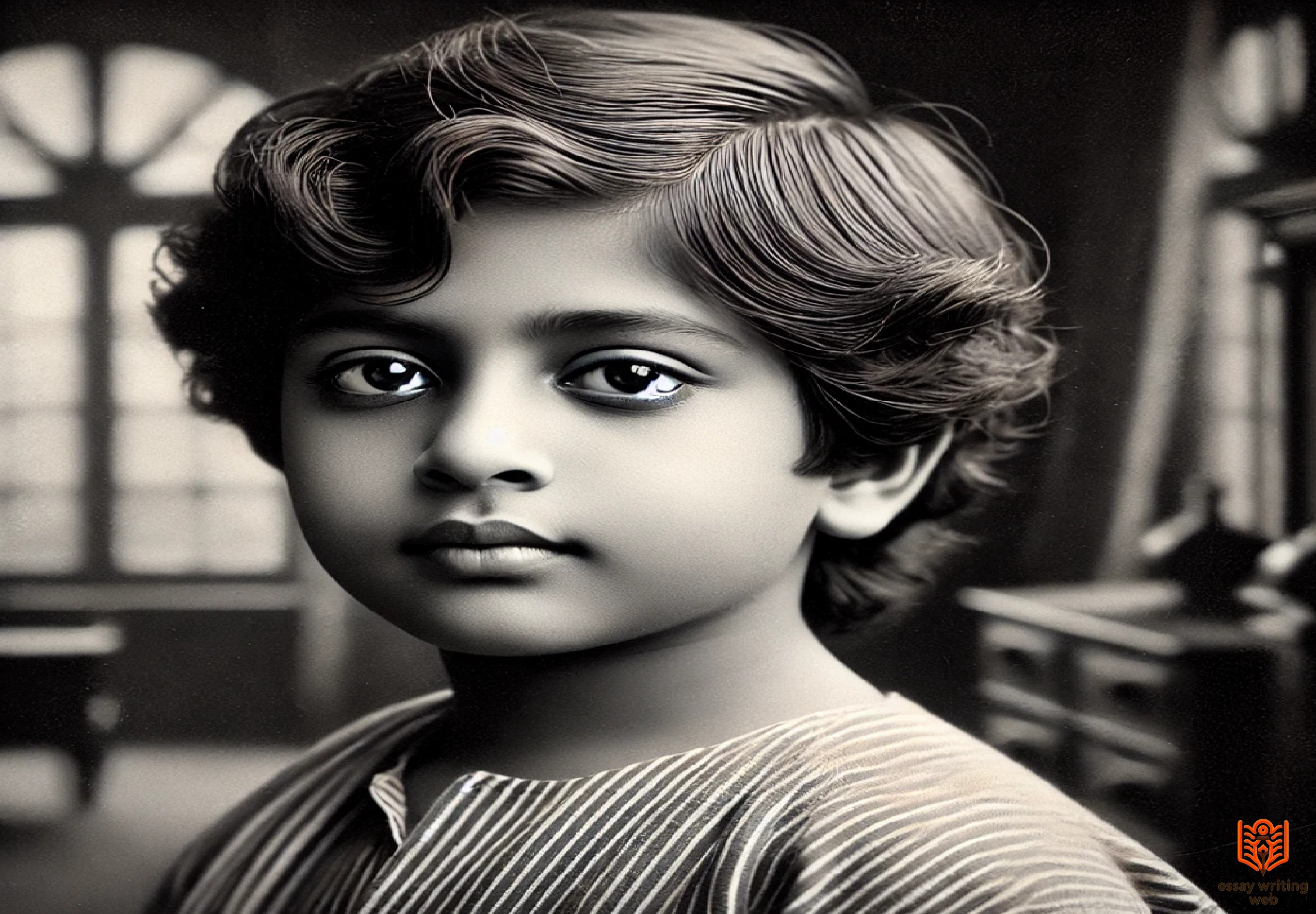
Rabindranath Tagore, one of India’s greatest literary figures, was born on May 7, 1861, in the Jorasanko Thakur Bari, a culturally rich family in Calcutta (now Kolkata). His early education was unconventional compared to the standard schooling of the time. Tagore was largely homeschooled by tutors, and his education was deeply rooted in his family's commitment to literature, music, and philosophy. His father, Debendranath Tagore, a prominent Brahmo Samaj leader, greatly influenced young Rabindranath’s spiritual and philosophical outlook.
Tagore’s early education was shaped by a diverse array of influences. While he attended several schools in Calcutta, he found the rigid, rote-learning methods uninspiring. His love for nature and creativity blossomed as he roamed freely in the family’s sprawling estate, absorbing the beauty around him. At the age of 17, he traveled to England to study law at University College London but left before completing his degree. The experience broadened his horizons, introducing him to Western literature, particularly the works of Shakespeare and English Romantic poets, which left a lasting impact on his writing.
However, the greatest influence on Tagore was his cultural and intellectual surroundings at home. His father’s philosophical teachings, coupled with the cultural richness of the Tagore household, laid the foundation for his later works, blending Eastern spiritualism with Western literary forms. This unique fusion of influences is evident in his diverse contributions to literature, music, and education, making him a global literary icon.
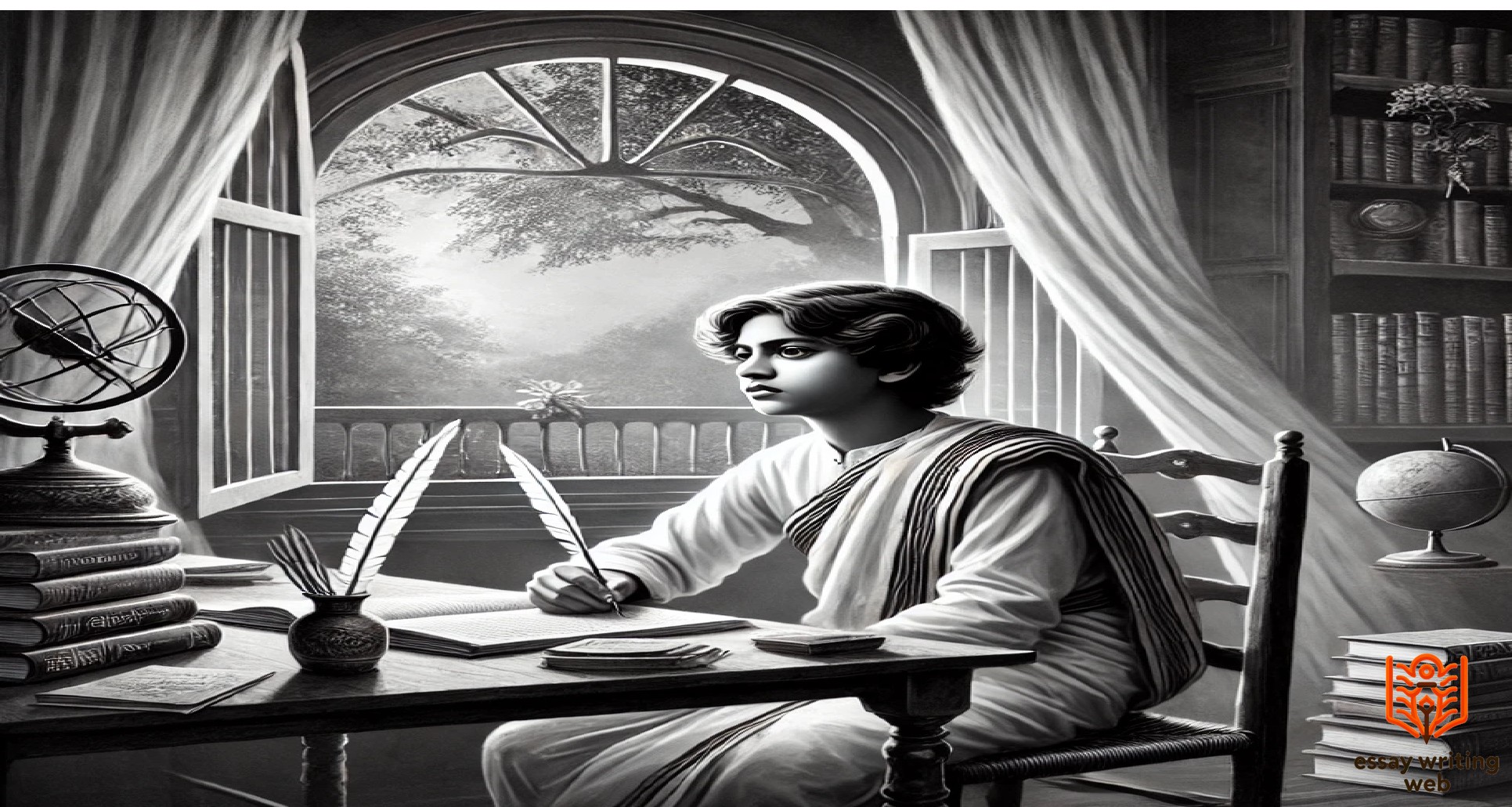
Rabindranath Tagore, a luminary of Indian literature, made significant contributions through his poetry, novels, short stories, and essays. His works reflect a profound understanding of human nature, spirituality, and the complexities of social and political life. Among his many contributions, "Gitanjali" and "The Home and the World" stand out as landmarks in world literature.
"Gitanjali" (Song Offerings), a collection of devotional poems, perhaps Tagore's most celebrated work. Published in 1910 in Bengali and translated into English in 1912, it earned him the Nobel Prize for Literature in 1913, making him the first non-European to receive this honor. The poems in "Gitanjali" express a deep connection with the divine and are filled with themes of love, surrender, and the transcendence of the human soul. Tagore's simple yet profound language, often reflective of the Upanishadic traditions, resonates with universal spirituality and humanism.
"The Home and the World" (1916), a political novel, captures the conflicting ideologies of nationalism and individualism during the Indian independence movement. The story revolves around three main characters Nikhil, his wife Bimala, and Sandip, a fervent nationalist leader. The novel explores the tension between personal loyalties and political ideals, highlighting the emotional and intellectual struggles individuals face in times of political upheaval. It critiques the blind fanaticism of nationalism while championing rationality and ethical considerations in public life.
Other major works by Tagore include "Kabuliwala," a poignant short story about human connections, and "Chitrangada," a lyrical play that blends myth with feminist ideals. Tagore’s extensive body of work continues to influence literature and thought, not just in India, but globally. His writings stand as a testament to the synthesis of tradition and modernity, making him one of the most respected writers of the 20th century.
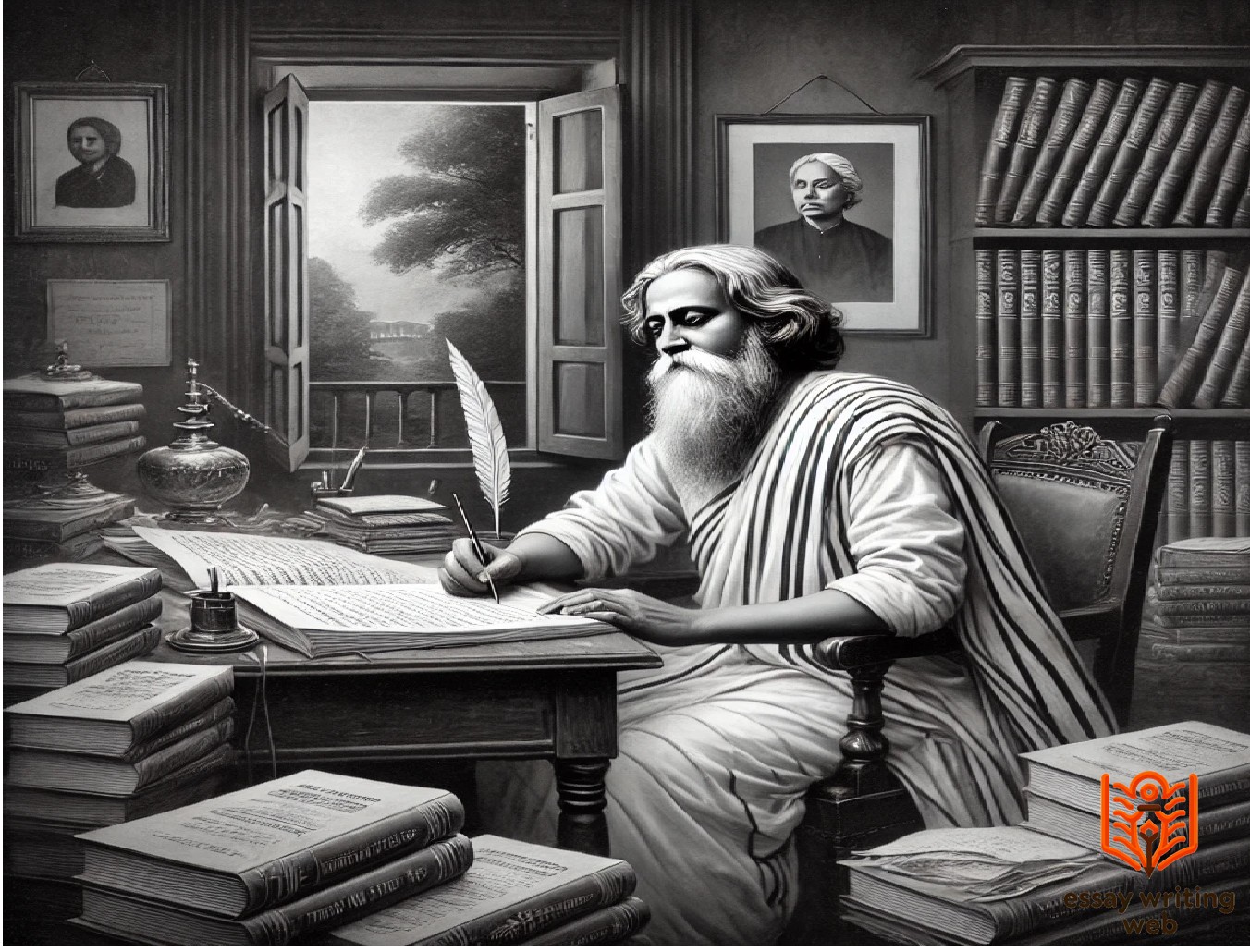
Rabindranath Tagore was not only a literary genius but also a visionary thinker whose views on education were revolutionary. He believed that conventional education systems, which focused on rote learning and strict discipline, stifled creativity and the natural curiosity of students. Tagore's educational philosophy was deeply rooted in a holistic approach, emphasizing the harmonious development of the mind, body, and soul.
Tagore’s most significant contribution to education was the founding of Visva-Bharati University in 1921 at Santiniketan. His vision for this institution was based on the idea of creating a space where learning was not confined to classrooms but was integrated with nature and culture. He believed that the natural environment should be a central part of education, as it nurtures creativity, self-reflection, and a sense of freedom. At Visva-Bharati, students engaged in outdoor learning, arts, music, and hands-on experiences that encouraged holistic development.
Tagore strongly opposed the colonial model of education prevalent in India, which he believed was focused on producing clerks for the British administration rather than nurturing independent thinkers. He advocated for an education that promoted critical thinking, creativity, and global citizenship. His ideal education system was one that transcended geographical boundaries and embraced the unity of humanity, a concept he often called "Visva Vidya," or universal knowledge.
In addition to formal subjects, Tagore emphasized the importance of the arts, particularly music and painting, in education. He believed these forms of expression were essential for students to explore their inner selves and understand the world around them. His emphasis on self-expression, love for nature, and respect for cultural diversity made his educational philosophy truly unique and forward-thinking.
Today, Visva-Bharati University continues to embody Tagore’s vision, fostering creativity, cultural exchange, and the pursuit of knowledge without borders. His views on education remain relevant, offering an alternative model that values freedom, creativity, and humanity’s deep connection with nature.
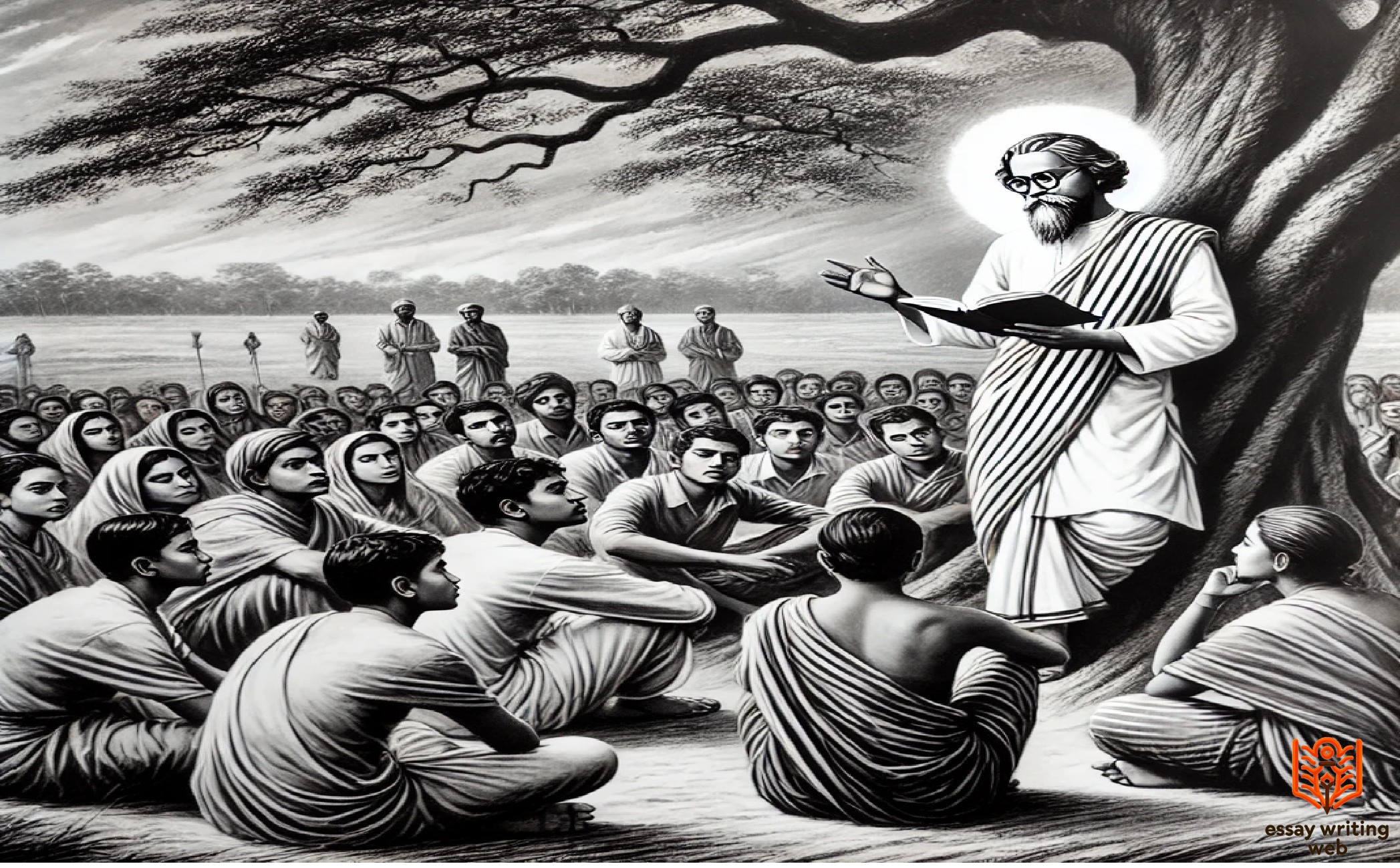
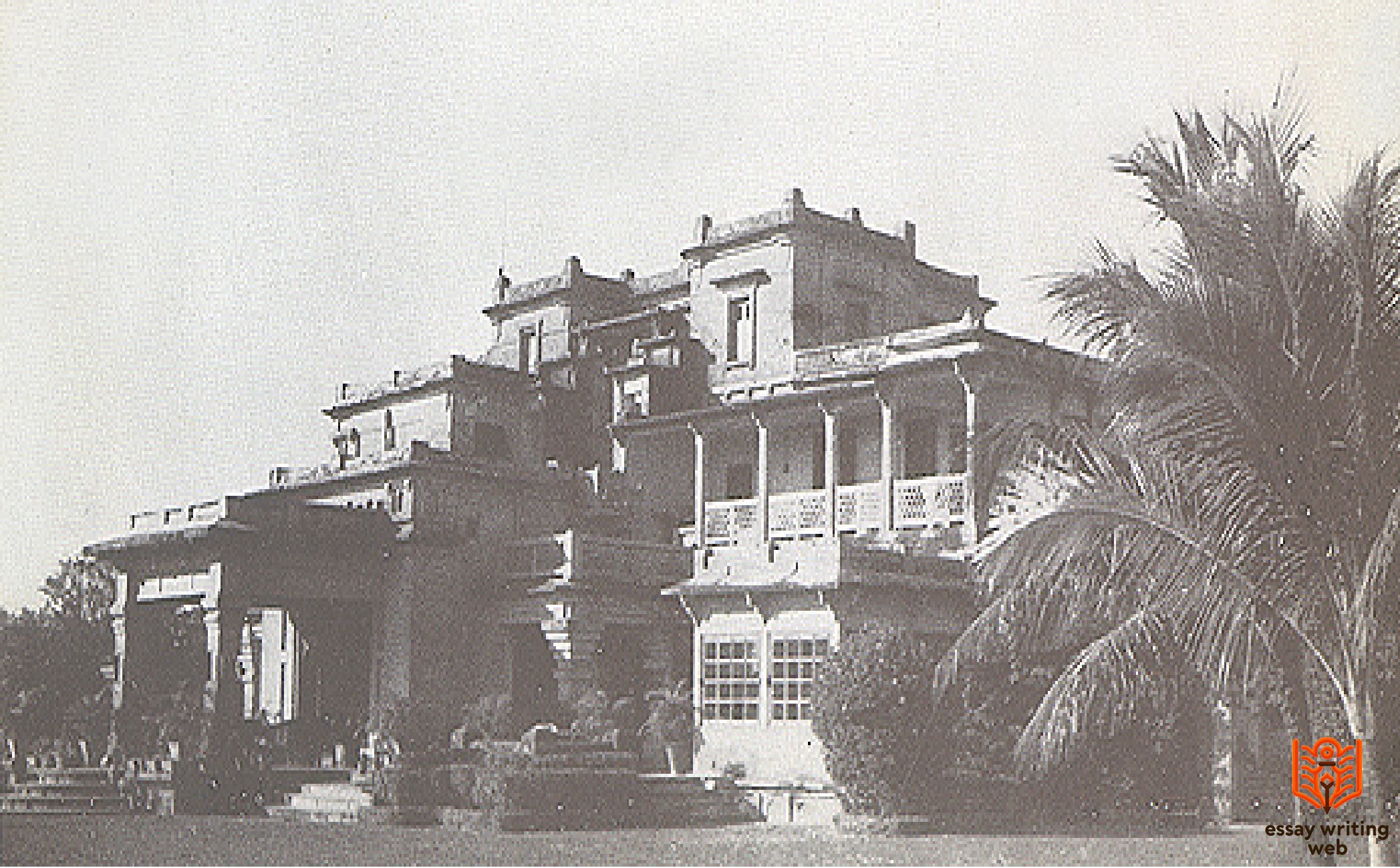
India's National Anthem, "Jana Gana Mana," was written by Rabindranath Tagore in Bengali. He composed the lyrics in 1911, and the song was later adopted as the National Anthem of India by the Constituent Assembly on January 24, 1950.
While Tagore penned the lyrics, he did not originally sing the anthem. However, the first public performance of "Jana Gana Mana" took place at the 1911 Indian National Congress session. The anthem is traditionally sung by various artists, choirs, and citizens during national events, with the most recognized and official versions performed by national choirs. Tagore’s lyrical composition, with its rich cultural and philosophical undertones, celebrates the unity and diversity of India.
Rabindranath Tagore, one of the most revered figures in Indian and global literature, received numerous awards and honors throughout his life, reflecting his immense contributions to literature, art, music, and education. Tagore’s works transcended linguistic and cultural barriers, earning him international recognition and acclaim.
The most prestigious of his honors came in 1913, when Tagore became the first non-European to be awarded the Nobel Prize in Literature for his collection of poems, "Gitanjali" (Song Offerings). The Nobel Committee praised the work for its profound spiritual and lyrical quality. Tagore’s win not only brought global attention to his literary genius but also put Indian literature on the world stage for the first time. The Nobel Prize remains one of the most significant achievements of his career.
Tagore was also honored by the British Crown with a knighthood in 1915 for his contributions to literature. However, in a powerful act of protest, he renounced this title in 1919 after the Jallianwala Bagh massacre, where hundreds of unarmed Indian civilians were killed by British forces. This act of defiance highlighted Tagore’s deep commitment to India’s struggle for independence and his moral stance against British colonial rule.
In addition to these international honors, Tagore was widely celebrated in India. Rabindranath Tagore was affectionately called "Gurudev" which means "revered teacher," by his admirers. Tagore also founded Visva-Bharati University in 1921, which was later recognized as a central university and an institution of national importance by the Government of India in his honor.
Tagore’s influence extended beyond literature into the realms of music and art. Rabindranath Tagore composed India’s national anthem, "Jana Gana Mana," which further cemented his legacy in Indian history. His works continue to inspire millions, and his contributions to art, culture, and education are commemorated through various awards and honors named after him.
Even decades after his passing in 1941, Rabindranath Tagore remains an iconic figure whose awards and honors symbolize the global recognition of his literary brilliance and the indelible impact of his creative genius on humanity.
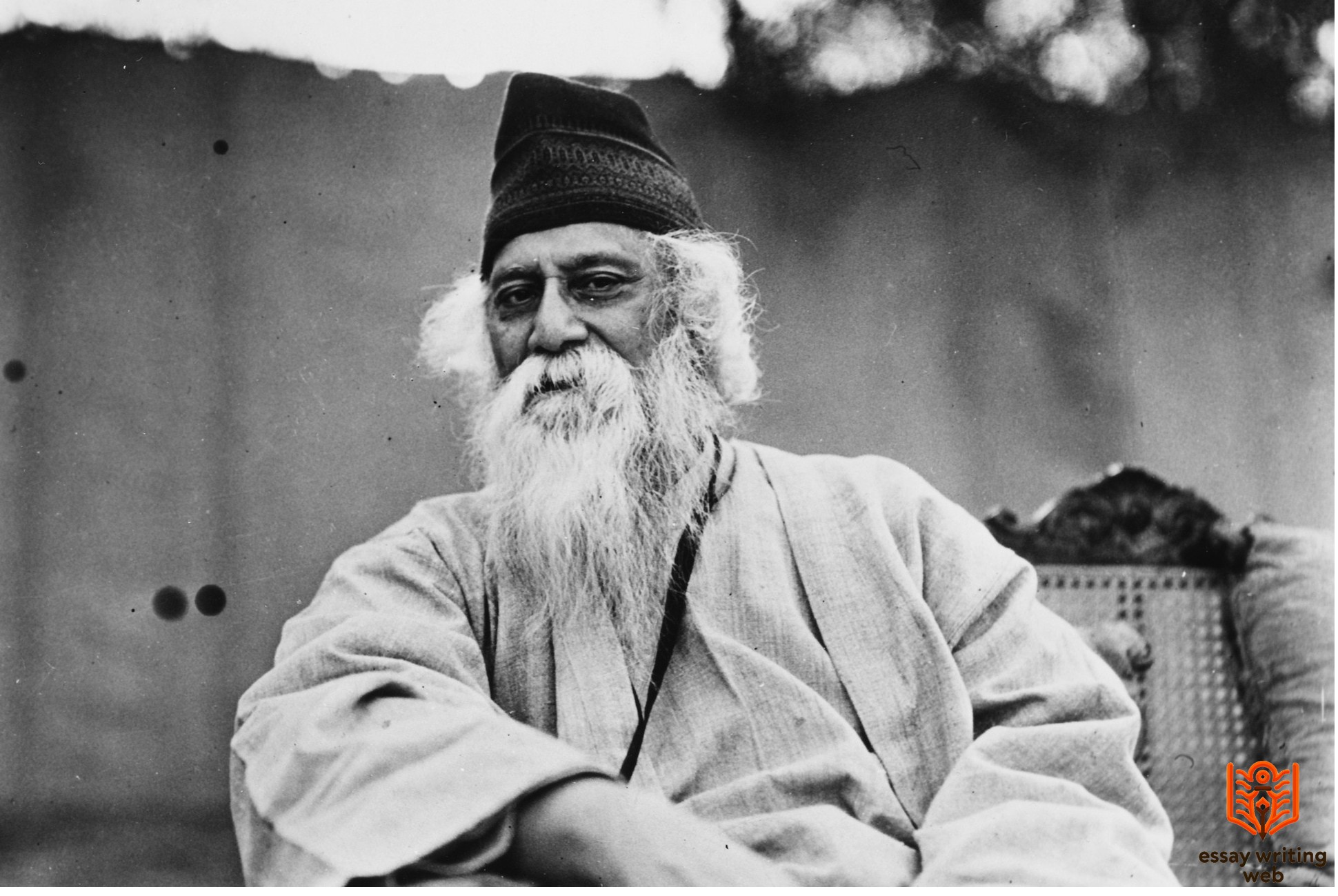
Rabindranath Tagore's work continues to inspire and resonate across generations and cultures, long after his passing in 1941. His literary and artistic contributions hold a timeless quality, addressing universal themes like love, freedom, humanity, and spirituality. These themes, articulated through his poetry, novels, plays, and essays, make Tagore's work as relevant today as it was during his lifetime.
One of the primary reasons Tagore’s works continues to inspire is his deep understanding of the human condition. His poems in "Gitanjali", for example, explore the relationship between the individual and the divine, offering solace and reflection in times of uncertainty. His emphasis on inner peace, compassion, and universal love resonates strongly in today’s fast-paced, often fragmented world.
Tagore’s ideas about education, particularly through his founding of Visva-Bharati University, also remain influential. His vision of an education system rooted in creativity, free thought, and harmony with nature offers a progressive alternative to modern, rigid education structures. Many educators today draw on Tagore’s principles of holistic learning and fostering critical thinking.
Moreover, Tagore's advocacy for social reform, particularly in the realms of gender equality and nationalism, continues to influence contemporary discourse. His nuanced critique of nationalism in works like "The Home and the World" is increasingly relevant as societies grapple with the rise of hyper-nationalism globally.
In the realms of art, music, and literature, Tagore’s influence is felt worldwide, inspiring creative minds to merge tradition with modernity, just as he did. His timeless wisdom and creative genius ensure that his work continues to speak to the heart of humanity today.